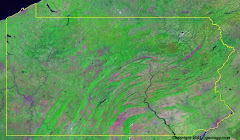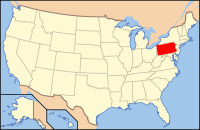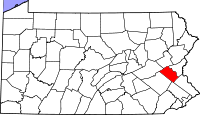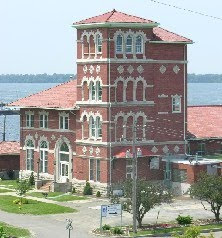Wednesday, July 8, 2009
History of Lehigh Valley languages
http://www.lehighvalleylanguageland.blogspot.com/
Heritage Languages
I recently became acquainted with the term "Heritage Language." I don't know if there is one official definition of the term. Some online articles refer to it as a language spoken at home (other than English) by residents of the United States.
I wonder if the term can also refer to an individual's family's ancestral language, even if it's not spoken in their home or hasn't been for generations. There are many families in the Lehigh Valley who have a heritage language, but don’t speak it on a daily basis at home, e.g. Pennsylvania German, Ukrainian, Yiddish, etc.
I feel that we suffer loss when we lose the ability to understand or speak our heritage language. Sayings, lullabies, prayers, nursery rhymes, jokes in that language are forgotten. The wisdom contained in these word may have been passed down in our families for hundreds, or even thousands of years.
When you move to a new place, you learn the language in school or at work…but your teachers and co-workers will not sing you lullabies or chant silly childish nursery rhymes to you in the new language. The children who forget their ancestral language will have no lullabies to sing to their babies.
When you immigrate to a new place, your first priority is to learn the new language. It's necessary for education and employment, and in understanding and taking part in your new community. But it seems that from what I've read and heard, learning a new language is not hindered by retaining use of the "old" one - it shouldn't be a case of "either or."
Upon arriving at the new country, parents should try to learn the new language as quickly as possible, even if it's difficult for them. Then they can help their children to learn it, while encouraging them to value their heritage language. Feeling ashamed of their native language will give a child negative feelings and resentment about languages, instead of pleasure.
Children learn English so much more easily than their parents and forget the old language so quickly that it's hard for them to have a conversation together. And with their grandparents, it may be impossible!
Parents can convey a love of languages to their child. Languages can be fascinating - with each one you can view life and express yourself in subtly different ways. It's like painting - you can create shades of meaning with colors.
Children child can feel excitement about learning a new language if they treasure the "old" one and realize that woven in the words of prayers and songs are connections to years of their family's love and wisdom that is passed down to them.
When children understand that language is a tool to express their feelings, they may be happy to add a new "tool," and interested in the differences between the two. It's fun to express yourself in new ways!
A language is something to be treasured during an entire lifetime, and may bring unexpected pleasure in later years. A person who comes across something in their ancestral language - a poem or prayer, a saying or a song - that they hadn’t heard since childhood may rediscover buried emotions.
Many Pennsylvania German people I know in the Lehigh Valley are still fluent in their language 350 years after their families immigrated to America! This contrasts with families who came to the U.S. during the 1900s - most of them seem to have completely forgotten their ancestral language. Pennsylvania German people appreciate the fact that there are things said in "the dialect" that don't translate well into English. Many jokes are funny in "Dutch" but fall flat in English. The entonation of the voice adds an interesting layer of feeling in Pennsylvania German.
It is a sad fact that prejudice against Germans during World War I and II caused parents during those years to discourage their children from learning "the dialect." Many of these children in the Lehigh Valley area, now in their "senior" years, can understand the dialect, but not speak it. This will be the last generation it is spoken in many of these families.
People who have come here not knowing how to read and write the old language find it even harder to pass down the language through the generations. There are many cases where the immigrants speak a dialect which is not the standard written language of that country. In Italy and many other places there are local dialects that are not written.
This was also true for the Pennsylvania Germans, who did not speak the same dialect as the one that books and hymns were written in. There are no Bibles or songbooks in your language pass down. Also, many people who've immigrated, especially up to the early 1900s just never had the opportunity to learn to read and write in their "old" country.
My heritage is primarily German. Unfortunately, I did not learn any German growing up. My parents only spoke English, and my grandparents were not alive. I am sad that I didn't have a chance to hear it spoken, or learn some lullabies or sayings. Maybe that's why I encourage immigrants to value their parents' ancestral language.
I found an online entry about a book on heritage languages. I don't know any more about the book than the quote below, which was copied from this web site.
http://www.languagebooks.com/books/heritage_language_development.html
Heritage Language Development Edited by Stephen D. Krashen, Lucy Tse and Jeff McQuillan
"Most people think that immigrants resist giving up their heritage or family language. Just the opposite is true: Heritage languages are lost rapidly, victims of language shift, a powerful process that favors the language of the new country over the language of the family. The papers in this volume argue that heritage language development, in addition to full development of the language of the country, is an excellent investment, both for the individual and for society. Heritage language development can lead to academic and economic benefits, can be an important part of identity formation, and enables the heritage language speaker to profit from deeper contact with family, community and the country of origin. Other sections discuss parental support for heritage language development, and how heritage languages can be effectively (and easily) fostered."
I assume that this quote is taken from the book or is written by the editors of the book. I would appreciate any comments about people's experiences, feelings, or knowledge of this subject.
Sunday, July 5, 2009
Stories from Friends
Thoughts about dialects and changes in English are interesing also. I just noticed the other day, when hearing people talk on television, a way of phrasing that seems new to me. People start sentences with the word "so" in a different way than when I was growing up. We only used "so" if the following statement was a direct consequence of the previous one. "He threw the ball to me, so I caught it." But now, it seems like new topics are opened with "so". That's very interesting! Has anyone else observed this?
Languages are always evolving... reflecting the changes in culture and geography, in a fascinating dance!
Geography is always changing also! My friend Alan tells me about chess games he plays in person and on the internet. I've learned a lot of geography from those stories, because his matches are with people from all over the world. I remember when he told me how the matches of an international chess organization (FIDE?) were affected by the breakup of the Soviet Union. Suddenly that huge region was no longer sending just one brilliant player. Each new country was now sending its own!
Please post any stories or observations you have from your daily life!
Houses of Worship and Ethnic Customs and Languages
Many Roman Catholic churches that were built about one hundred years ago in Pennsylvania were built by immigrants from Eastern and Southern Europe. The churches lie in the general area of Northampton, Lehigh, Carbon, Schuylkill and Northumberland counties - I'm not sure which others. The parishes reflected these families' cultures and languages. The workers had various occupations - many worked in the coal mines, others at Bethlehem Steel.
Last summer, over 60 of these churches were closed - many combined into single parishes with no particular ethnic identity. Before the churches closed, I was able to visit masses at several in South Bethlehem - Hungarian, Slovenian, Slovak, and Polish. I heard beautiful hymns and prayers in these languages. These final masses were so sad - and I wasn't even a member. Inside these walls, peoples' lives had been shared for so many years - the happy times and the sad times.
Then the doors were locked, and the people were left outside, looking in. They looked through stained glass placed by their ancestors, many reflecting scenes of the towns they'd left behind in Europe. The builders wanted their children to remember where they'd come from.
I would enjoy hearing from parishioners of temples, churches and other organizations that use the language of their ancestors for services. I would imagine that these concepts and words hold special meaning when they are expressed in these ways.
Lehigh Valley - News to Share
Kutztown Folk Festival
One speaker, I think it was Dr. Donner from Kutztown University, said that the festival is in its 60th year. It is called a "folklife" festival rather than "folklore" festival, because it highlights the culture by showing the way people live, such as crafts and farming. The word "folklore" seems more limited to just words and stories.
From what I understand, the Pennsylvania Germans arrived in Pennsylvania in the 1600s and 1700s. Most of them came from areas of what is today southwest Germany, and part of Switzerland. I think that Germany did not actually become a country until much later, around 1870. The people spoke several local dialects, and after they arrived here those dialects blended, and also evolved over time. (The language and people are sometimes called "Pennsylvania Dutch" because the dialect word for "German" is Deitsch, which sounded to English ears like "Dutch".)
At the festival, I ran into Frank Shuler and his wife Janice from my Pennsilfaanisch Deitsch Freind (Pennsylavania German Friends organization). They told me that Paul Kunkel was going to be speaking in the Seminar tent, and I was very happy to hear that. Paul has been a leader in Pennsylvania German cultural education for many years. He was my teacher in a Pennsylvania German class, in a Groundhog Lodge course, almost twenty years ago!
I really enjoyed his talk today - about Pennsylvania Dutch superstitions. What made it interesting is how he related it to what family members told him as he was growing up. So much more real than reading about these things in books! Then he told a story in the dialect, as a friend of his translated. That was delightful - I could compare the sounds of each sentence in German and English. That helped me learn more of the dialect - somehow it seemed easier to understand this way. Perhaps because the sentences were broken down one-by-one, I didn't lose the gist of the story as easily.
The other speakers were interesting also - topics were: One-room schoolhouses, quilts, jokes, and Pennsylvania Germans in the Civil War. The Pennsylvania German Society sponsored the venue, and it was evident how much work went into the preparation by all involved.
I got to experience a little of the rest of the festival - crafts, food and music. I hope to go again next year to see more.
Latino Leadership Alliance of Lehigh Valley
A member of the organization hosted a wonderful dinner meeting this week. I got to see old friends and make new ones, and enjoy some delicious homemade Latino dishes. We discussed the coordination of publicity about various projects of the committees, such as education and health.
At our gatherings I meet people from many different countries and cultures. This week, some of us had a discussion after dinner about how the culture and geography of where we grew up and lived in at different times has influenced our outlooks on life. Our stories reflect sad times and happy times, and they are always interesting.
As far as my family history, most of my ancestors came from Germany in the 1800s. I'm sad about the fact that I didn't get the opportunity to learn German from them.
I enjoy languages and learn about them whenever I can. I studied Spanish in school, which I enjoyed very much, and still like to speak. I have also learned a little bit of German, French, and several other languages, through classes and friends. Thanks to all those who've taught me!
Attendance and membership in the Latino Leadership Alliance of the Lehigh Valley are open to anyone. Monthly meetings usually take place at the Lehigh County Government Center at 8:30 a.m. on the third Tuesday of every month, except July and August. The Government Center is located at 17 S. 7th Street in Allentown.
For further information, see the organizations web site at www.llalv.org. Meetings are conducted in English, and there is no charge to attend. The organization also holds meetings and activities of various committees, and several special events each year.
Lenape Culture Workshop to be held in Easton on July 12
(Thanks to the Lehigh Valley Arts Council Calendar, July/August issue, pages 5-6, for the information. The calendar is published six times a year by the Lehigh Valley Arts Council.)
The Lenape workshop will be held on the lawn behind Mixsell Museum, 101-107 S. Fourth Street, Easton. (Rain location: St. John's Lutheran Church Social Hall, 330 Ferry Street, Easton.) Easton is in Northampton County, across the Delaware River from Phillipsburg, New Jersey.)
Donations accepted. Registration required - call 610-253-1222.
Note from Pat:
The Lenni Lenape are a sub-group of Algonquins who lived in this area (Lehigh Valley) before the Europeans arrived. From what I understand, their tribal headquarters is now in Oklahoma. I think that the language is no longer being spoken - I heard that the last native speaker recently died, but I'm not sure of this.
Many place-names in the Lehigh Valley are derived from those given by the Lenape, such as the word "Lehigh". Many of these names describe the physical characteristics of a place (as opposed to naming a place after a person). I read a beautiful poem about Lenape river names, but I don't know who the author is. The last line goes something like this: "Their names are on your waters and ye cannot wash them out."
I do not know anything about this group - Lenape Nation of Pennsylvania. Below are a couple of links to information about them:
http://www.lenapenation.org/main.html
http://www.museum.upenn.edu/new/exhibits/FAP/sections.shtml



